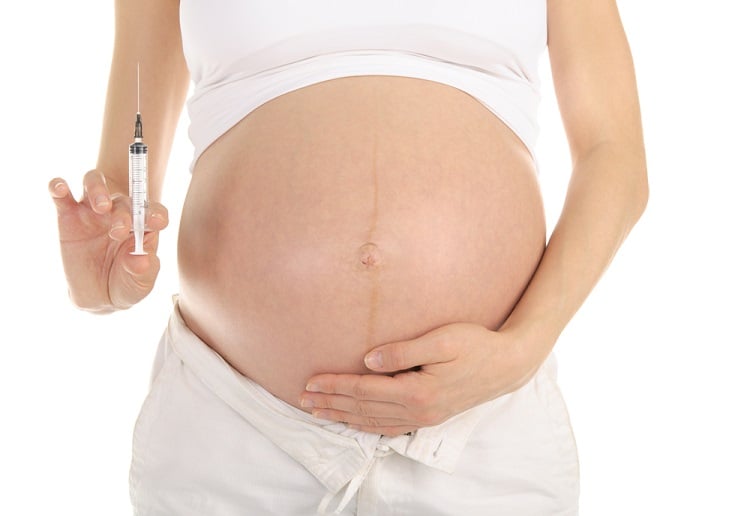Should I get the flu shot if I’m pregnant? There is no live virus in a flu vaccine. So you can’t catch the flu.
Jane E Frawley, University of Technology Sydney and Elizabeth Sullivan, University of Technology Sydney
Australia experienced a severe flu season last year with over a quarter of a million confirmed cases. Pregnant women are a high‐risk group where the disease can cause more serious illness when compared to the general population.
Vaccination is the best way of protecting a pregnant mum against the potentially
severe consequences of flu in pregnancy. But for a variety of reasons, vaccine uptake is poor.
Australian information suggests around half of all pregnant women have the flu vaccine. Added to this is the concern that only 25% of the general public have a seasonal flu shot, which, at a population level, is too low to protect vulnerable groups such as pregnant women and children.
Read more:
Vaccines to expect when you’re expecting, and why
Many women don’t have a flu shot during pregnancy as they either believe flu isn’t
a serious illness, have concerns about the safety of the vaccine or it wasn’t
recommended to them by a health professional.
The flu virus spreads easily around the world and is very difficult to control. Unlike the common cold, seasonal flu is a serious illness, which the World Health Organisation estimates causes between three and five million cases of severe illness globally each year. And between 290,000 and 650,000 deaths occur annually from flu worldwide.
Coughing and sneezing – which transfers the virus into droplets that
move through the air – are the most common ways the virus is spread. But you can
also become infected by touching surfaces where droplets have landed.
Flu can cause serious medical complications for a pregnant woman and her baby. It has been associated with stillbirth, and in rare cases, maternal death. Babies can also be born either too early or underweight at term.
It’s important to note these complications from the flu virus can happen in healthy pregnancies. Pregnant women are more often admitted to hospital and intensive care as a result of the flu, compared to the general population.
What are the benefits of having the flu vaccine during pregnancy?
There are three main benefits to being vaccinated against the flu during
pregnancy:
- The vaccine protects you and your unborn baby against the flu. The
effectiveness of the flu vaccine varies from year to year depending on
various factors, including how well the vaccine is matched to seasonal
influenza strains. But research shows individuals who have the vaccine and still contract the flu are less likely to develop severe consequences. Research is currently underway to develop
a better vaccine that is more broadly effective and doesn’t have to be
administered every season. But at the moment, the current seasonal
vaccine is the best protection we have for a mum and her unborn baby. - Your baby is protected for the first few months after being born. Babies
younger than six months are at increased risk of respiratory illnesses
compared to babies of mothers who had been vaccinated against the flu.
Infants cannot receive the flu shot until they are six months old making this
a particularly vulnerable time. When the flu vaccine is given in pregnancy
(especially in later pregnancy), maternal antibodies are transferred
through the placenta to the unborn baby, protecting the infant in their first few months of life. - The flu vaccine may also protect you against whooping cough. Recent research has found women are less likely to get whooping cough during pregnancy if they’ve had the flu shot. The vaccine prevented many mums from contracting the flu, which subsequently protected them from a whooping cough co‐infection.

picsea unsplash, CC BY
How safe is the flu vaccine in pregnancy?
To evaluate safety, researchers compare pregnancy outcomes such as early
pregnancy loss, preterm birth, stillbirth, congenital abnormalities and the baby’s
birth weight between women who were vaccinated and those who weren’t.
Research has consistently demonstrated it’s safe to have the flu vaccine during pregnancy. A growing number of studies have suggested vaccination may even reduce the risk of preterm birth, stillbirth and improve an infant’s birth weight.
A popular myth that continues to circulate is that the flu vaccine can give you the flu. The flu vaccines given in Australia do not contain live virus, so contracting flu from the vaccination is impossible.
Read more:
Explainer: what is the flu?
The immune system is still able to recognise the virus and produces antibodies that protect you against the flu. This immune response can sometimes be uncomfortable and in some individuals, may cause mild symptoms such as swelling and pain around the injection site, rash or a temperature.
AusVaxSafety ‐ a national vaccine surveillance system closely monitors vaccine safety in Australia. Researchers review de‐identified data gathered from immunisation clinics, general practices, hospital clinics, community‐based clinics, and Aboriginal Medical Services across Australian to monitor vaccines.
When do I get the flu vaccine if I’m pregnant?
The flu vaccine is funded under the National Immunisation Program for pregnant
women and is therefore free. You can have the vaccine any time during pregnancy.
It’s important to note if you were vaccinated against the flu at the end of the 2017 season in early pregnancy and haven’t given birth, you can also have this
year’s vaccine. This will protect you and your baby from the flu strains currently circulating.
Read more:
Explainer: what’s new about the 2018 flu vaccines, and who should get one?
What do I do if I have flu symptoms?
![]() It’s always best to call your doctor or clinic if you’re pregnant and develop flu-like symptoms such as fever, body aches, cough and headache. It’s advisable to do this even if you’ve been vaccinated against the flu. There are medications your doctor can recommend that are safe for use during pregnancy; however, they work best if commenced within a couple of days of symptoms starting.
It’s always best to call your doctor or clinic if you’re pregnant and develop flu-like symptoms such as fever, body aches, cough and headache. It’s advisable to do this even if you’ve been vaccinated against the flu. There are medications your doctor can recommend that are safe for use during pregnancy; however, they work best if commenced within a couple of days of symptoms starting.
Jane E Frawley, NHMRC Research Fellow, University of Technology Sydney and Elizabeth Sullivan, Assistant Deputy Vice Chancellor Research and Distinguished Professor of Public Health, University of Technology Sydney
This article was originally published on The Conversation. Read the original article.




















-

-
-
becstalou said
- 20 Jun 2018
-

-
-
sambii said
- 15 Jun 2018
-

-
-
mom81879 said
- 14 Jun 2018
-

-
-
Mum2archer said
- 14 Jun 2018
-

-
-
mom114371 said
- 14 Jun 2018
Post a comment1:10 pm
10:17 pm
2:16 pm
12:26 pm
10:41 am
To post a review/comment please join us or login so we can allocate your points.